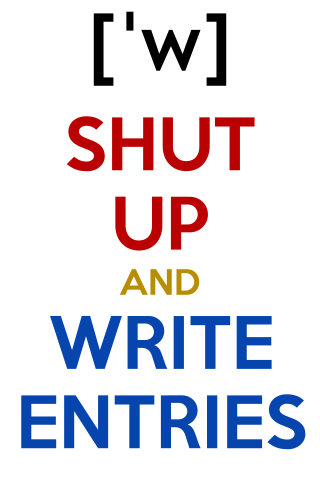
Rubbernecking is a derogatory term primarily used to refer to bystanders staring at accidents. More generally, it can refer to anyone staring at something of everyday interest compulsively. The term rubbernecking derives from the neck's appearance while trying to get a better view, that is, craning one's neck.

Eric Honeywood Partridge was a New Zealand–British lexicographer of the English language, particularly of its slang. His writing career was interrupted only by his service in the Army Education Corps and the RAF correspondence department during World War II.
Bollocks is a word of Middle English origin meaning "testicles". The word is often used in British English and Irish English in a multitude of negative ways; it most commonly appears as a noun meaning "rubbish" or "nonsense", an expletive following a minor accident or misfortune, or an adjective to describe something that is of poor quality or useless. It is also used in common phrases like "bollocks to this", which is said when quitting a task or job that is too difficult or negative, and "that's a load of old bollocks", which generally indicates contempt for a certain subject or opinion. Conversely, the word also appears in positive phrases such as "the dog's bollocks" or more simply "the bollocks", which will refer to something which is admired or well-respected.
A specialized dictionary is a dictionary that covers a relatively restricted set of phenomena. The definitive book on the subject includes chapters on some of the dictionaries included below:
Yob is slang in the United Kingdom for a loutish, uncultured person. In Australia, the word yobbo is more frequently used, with a similar although slightly less negative meaning.
A basha is a waterproof canvas or plastic sheet with eyelets or loops on the perimeter, which is used in camping, outdoor, or military situations to act as a shelter, in the form of an impromptu tent and/or groundsheet, usually supported with rope or even bungee cords attached to trees.
A slang dictionary is a reference book containing an alphabetical list of slang, which is vernacular vocabulary not generally acceptable in formal usage, usually including information given for each word, including meaning, pronunciation, and etymology. It can provide definitions on a range of slang from more mundane terms to obscure sexual practices. Such works also can include words and phrases arising from different dialects and argots, which may or may not have passed into more common usage. They can also track the changing meaning of the terms over time and space, as they migrate and mutate.
Sexual slang is a set of linguistic terms and phrases used to refer to sexual organs, processes, and activities; they are generally considered colloquial rather than formal or medical, and some may be seen as impolite or improper.
A stunt cock is a substitute penis that is used during filmmaking, typically in pornographic films.

Coprophilia, also called scatophilia or scat, is the paraphilia involving sexual arousal and pleasure from feces.

A creampie is a sexual act, commonly featured in hardcore pornography, in which a man ejaculates inside his partner's vagina or anus without the use of a condom, resulting in visible seeping or dripping of semen from the orifice.

No worries is an expression seen in English meaning "do not worry about that", "that's all right", "forget about it" or "sure thing". It is similar to the American English "no problem". The phrase is widely used in Australian and New Zealand speech and represents a feeling of friendliness, good humour, optimism and "mateship" in Australian culture. The phrase has been referred to as the national motto of Australia.

A hair's breadth, or the width of human hair, is used as an informal unit of a very short length. It connotes "a very small margin" or the narrowest degree in many contexts.

"Shut up" is a direct command with a meaning very similar to "be quiet", but which is commonly perceived as a more forceful command to stop making noise or otherwise communicating, such as talking. The phrase is probably a shortened form of "shut up your mouth" or "shut your mouth up". Its use is generally considered rude and impolite, and may also be considered a form of profanity by some.
"Out of left field" is American slang meaning "unexpected", "odd" or "strange".
Sloppy seconds is a slang phrase for when a man has sexual intercourse with a female or male partner who already has received another man's penis in the relevant orifice and is therefore wet or "sloppy". The phrase "buttered bun" is sometimes used to refer to said orifice. The practice is also referred to as a "wet deck".

A bovver boot is a type of boot that has been associated with violence. Such boots are generally of sturdy design and may be steel-toed. They have been considered as offensive weapons used by hooligans for kicking opponents while street fighting. The boots became known in the late 1960s in the United Kingdom, and continue to be a fashion statement associated with rebellion.

"A load of old cobblers" and variants such as "what a load of cobblers" or just "cobblers!" is British slang for "what nonsense" that is derived from the Cockney rhyming slang for "balls" (testicles) of "cobbler's awls". The phrase began to be widely used from the 1960s and is still in use but has become less offensive over time as its origins have been forgotten.









